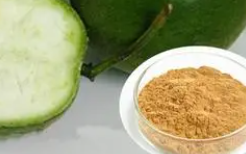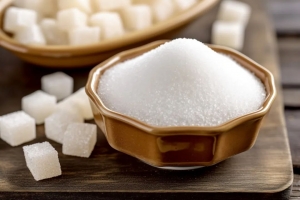Monk fruit sweetener is generally considered safe for consumption. Here are some key points regarding its safety:
Regulatory Approval:
Monk Fruit Sweetener is recognized as safe by regulatory agencies such as the U.S. Food and Drug Administration (FDA). The FDA has given monk fruit sweetener a Generally Recognized As Safe (GRAS) status.

Caloric Content:
Monk fruit sweetener is a low-calorie alternative to sugar. It contains significantly fewer calories than table sugar, making it a popular choice for those looking to reduce their calorie intake or manage blood sugar levels.
Blood Sugar Impact:
Unlike sugar, monk fruit sweetener does not significantly raise blood glucose levels, which makes it a suitable option for individuals with diabetes or those managing carbohydrate intake.
Allergies:
While rare, some individuals may be allergic to monk fruit or its extracts. Symptoms of an allergic reaction can include itching, hives, swelling, or difficulty breathing. If you experience any of these symptoms, stop using the sweetener and seek medical advice.
Digestive Issues:
Monk fruit sweeteners often contain other ingredients such as erythritol (a type of sugar alcohol) as a bulking agent. Sugar alcohols can sometimes cause digestive issues like bloating, gas, or diarrhea, particularly if consumed in large amounts.
Pregnancy and Nursing:
There is limited information about the safety of monk fruit sweetener during pregnancy or while nursing. It is advisable to consult with a healthcare provider before consuming monk fruit sweetener if you are pregnant or breastfeeding.
Long-Term Effects:
While monk fruit sweetener is considered safe, long-term studies on its effects are limited. However, it is generally well-tolerated and has not been linked to significant adverse effects.
In summary, monk fruit sweetener is considered safe for most people. However, if you have specific health concerns or conditions, it's always a good idea to consult with a healthcare professional before making any significant changes to your diet.
 The regulation of Monk Fruit Extract (also known as Luo Han Guo extract) varies across different cou
The regulation of Monk Fruit Extract (also known as Luo Han Guo extract) varies across different cou
 Health Canada Approves Monk Fruit Extract as a Natural Sweetener
Health Canada Approves Monk Fruit Extract as a Natural Sweetener
 New Breakthrough in Allulose: A Healthier Sugar Alternative Gains Momentum
New Breakthrough in Allulose: A Healthier Sugar Alternative Gains Momentum
 Understanding Reb-M: The Benefits of a Next-Generation Sweetener
Understanding Reb-M: The Benefits of a Next-Generation Sweetener